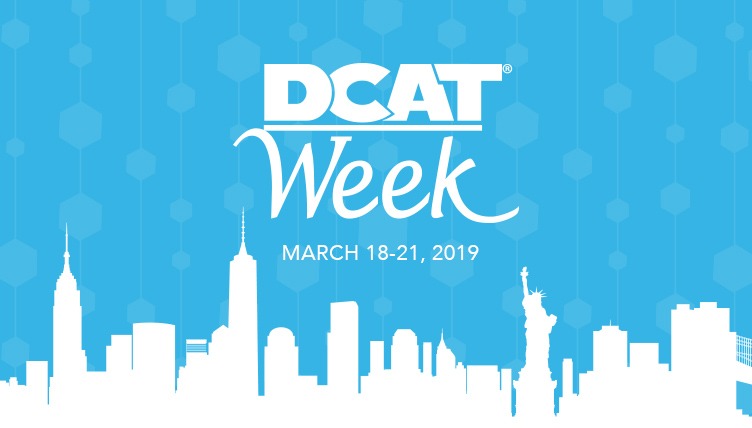DCAT Week ’19: Executive Insights and Best Practices
What is on the minds of leading pharmaceutical industry executives? The DCAT Week ’19 education programs featured insight on key issues impacting the pharmaceutical industry, manufacturing, and supply.
Changes in drug development and the impact on manufacturing and supply
The education programs at DCAT Week ’19, organized by the Drug, Chemical & Associated Technologies Association (DCAT) provided a unique opportunity to hear from leading pharmaceutical industry executives on the key issues impacting drug development and the impact on manufacturing and supply, including on supplier partnership models. DCAT Week offered two Executive Insights programs. The first program, Executive Insights I: A CEO View: Drug Development, Manufacturing, and New Technologies featured Marc N. Casper, President and Chief Executive Officer, Thermo Fisher Scientific, a $20-billion-plus global provider of services and products to the life sciences and pharmaceutical/biopharmaceutical industries and a separate program. The second program, Executive Insights II: The Future of Pharma/Biopharm Manufacturing and Supply featured Christopher Sinko, PhD, Senior Vice President and Head, Product Development, Bristol-Myers Squibb and Diane Blumenthal, Head of Technical Operations, Spark Therapeutics, who shared their views on the technologies, operational factors, and macro issues that will influence how manufacturing networks are managed and how product is supplied. Both programs were moderated by Patrick Yang, PhD, a seasoned industry veteran and now consultant and formerly Executive Vice President of Technical Operations for Juno Therapeutics, Roche and Genentech.
Several common themes emerged from the dialogue from these programs. The first involved the changing product mix in the industry’s pipelines, in terms of the complexity of molecules being developed, an increased focus on specialty drugs, including orphan drugs, as well as the emergence of new modalities, such as gene and cell therapies. Added to the mix are new paradigms involving more patient-centric models, such as in the form of precision medicines as well as innovation in drug delivery to allow for improved biometric monitoring and dosing regimes. Underpinning these developments is the larger role of Big Data and digital strategies in drug development overall as well as the adoption of digital approaches in manufacturing to enable greater automation, quality control, and process understanding.
These broader trends impacting the pharmaceutical industry present both challenges and opportunities in manufacturing and supply as was discussed in the executive forums. The introduction of new modalities, such as in gene and cell therapies, still niche product areas, require unique manufacturing technologies and supply lines compared with traditional modalities in small molecules and biologics. The rapid advancement of cell and gene therapy products through the early stages of clinical development have presented challenges in advancing these products through the complexity of later stages of product development and commercialization. Much like the learning curves and adaption required to industrialize manufacturing for biologic-based products more than 30 years ago, manufacturing for these new modalities, such as cell and gene therapies, has been and continues to evolve. Some challenges discussed at the executive forums in manufacturing for these newer modalities as well for traditional modalities in small molecules and biologics are shorter times between development and commercialization brought on by the nature of the modality itself and the therapeutic/patient need it seeks to address as well as through other market and regulatory incentives to bring product to market faster. More targeted therapeutic approaches, such as in personalized medicine or precision medicine, which implicitly require lower volumes, also create challenges to cost-efficiently manage manufacturing and supply lines.
 |
 |
 |
|
Marc N. Casper |
Christopher Sinko, PhD |
Diane Blumenthal |
Impact on sourcing, procurement and supply management
The challenges and opportunities arising from new modalities and the increased complexity in drug molecules and therapies was also addressed in the DCAT Week education program, Sourcing and Procurement: The Next Generation. Kimberly Lounds Foster, Corporate Vice President, Global Supply at Celgene and Hash Patel, Vice President of External Manufacturing and Strategic Sourcing at Celgene, discussed the implications for sourcing and supply management teams resulting from overall industry trends of greater innovation in drug platforms and collaborative research and development models. They provided further insight into managing supply networks with new modalities using chimeric antigen receptor (CAR) T therapies as an illustration.
As much as new technology impacts sourcing, procurement, and supply management teams, the ongoing need to reduce costs and drive value is a constant. In the Sourcing and Procurement education program at DCAT Week, Wynn Bailey, Partner, Life Sciences Supply Chain & Operations Consulting, PwC, and Rafael Lander, Partner, Life Sciences Supply Chain & Operations Consulting, PwC, outlined strategies for value capture in mergers and acquisitions as well as for overall best practices. They identified and discussed near-term value-capture levers in supply management, such as in order optimization, contract compliance, should-cost modeling, and complexity reduction with end-to-end suppliers, and innovative approaches to apply these approaches.
Value in innovation
 |
|
Dr. Francis Arnold |
The value and importance of innovation, a theme across several of the education programs at DCAT Week, was further underscored in a special keynote address by Dr. Frances H. Arnold, PhD, Nobel Laureate in Chemistry (2018). Dr. Arnold is the Linus Pauling Professor of Chemical Engineering, Bioengineering and Biochemistry and the Director of the Donna and Benjamin M. Rosen Bioengineering Center at the California Institute of Technology and was awarded the Nobel Prize in Chemistry in 2018 for pioneering the use of directed evolution to engineer enzymes. In the early 1990’s, she conducted the first directed evolution of enzymes, which are proteins that catalyze chemical reactions. Since then, she has refined the methods that are now used in a variety of applications, such as the development of new biocatalysts, which are applied in pharmaceutical synthesis, the manufacture of other chemicals, and in the production of renewable fuels. She has made significant contributions to advance the fields of protein engineering, directed protein evolution, structure-guided protein recombination, biocatalysis, and biofuels. Dr. Arnold discussed her journey in innovation, which involved a multidisciplinary approach throughout her career, and recent advances made by her research team at Caltech in biocatalysis and other areas.






